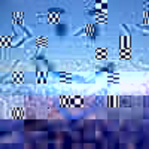What kind of event is this? (2)
-
 by
mwwm
by
mwwm
Hi
I had a question for any scientist: what kind of event is shown in this 5 ocv? When this was first served up I was sure it was going to be simulation data, but it appears to be real data.
Regards, Mitch
Posted
-
 by
jrfs
by
jrfs
hi mitch, i dont know the answer as I am only amateur. However, my question is this: seeing this in slice makes me suspect that it is not an ocv at all am i correct?
Posted
-
 by
Whoandwhatitis
moderator
by
Whoandwhatitis
moderator
This looks like an off-center vertex with backwards tracks (more about this in the FAQ).
It could be a decay, or an interaction with detector material that created a shower of particles.
Based on the curvature of the lines, four of them are similar and one is of the opposite charge, because in normal view you can plainly see that one curves in the opposite direction. Maybe these are electrons and positions? There doesn't seem to be much of a correlation between these particles and the hadron and electromagnetic (EM) calorimeters in the wide sections of the detector. However, the very narrow EM calorimeter areas are lit up pretty well in this area.
Be aware, I'm not an expert or a scientist.
Posted
-
 by
alanbarr
scientist
by
alanbarr
scientist
This is a really interesting event, and exactly the sort we are looking for.
If this was happening in an empty part of the detector, I would say it was an excellent candidate for a new particle decaying. What makes me a little dubious about this exact one is where the ocv actually occurs.
The place where the tracks originate is in the middle of the innermost tracking layer (grey rectangles close to the centre), which makes me think that something else might be going on here. What I think is probably happening is that a particle (of unknown type) has hit that layer of material, interacted with it, and sprayed out a large number of tracks from particles knocked out of that material.
It's sufficiently interesting that I think we will want to follow up on it. Many thanks for pointing it out.
Posted